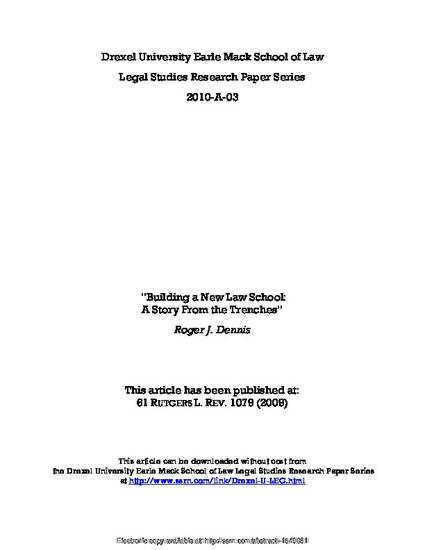
Article
Building a New Law School: A Story from the Trenches
Rutgers Law Review
(2009)
Abstract
(The following introduction is from "A Legal Education Prospectus: Law Schools & Emerging Frontiers in Curriculum, Lawyering, and Social Justice" symposium, held at Rutgers School of Law, Newark on April 17, 2009. Roger discusses his experiences starting a new law school, The Earle Mack School of Law at Drexel University.)
Thank you for the opportunity to return to Rutgers to participate in this symposium on legal education. This building is a wonderful facility; it is a real jewel in the Rutgers crown. Many other members of the Rutgers educational community come to the Rutgers-Newark Law School and immediately become infected with atrium envy. But what goes on here is much more significant than the law school’s physical beauty. Your law school is noted for its commitment to excellence in scholarly research. Rutgers-Newark is also recognized for its innovative teaching, particularly its very early commitment to clinical teaching. But most significantly, all of us in legal education recognize that Rutgers-Newark Law has, for many generations, an extraordinary and sustained commitment to social justice. All of this makes Rutgers-Newark Law a very special place indeed.
This is a striking moment for the legal profession and for legal education. The state of the economy has placed incredible stress on all components of the legal profession. That stress must be felt by law schools. Continuing a long-term trend, our colleagues in the practicing bar will ask us to bear more of the effort of training our graduates to be more fully-formed practitioners from the moment they graduate. The profession’s desire to shift costs coincides with calls within the academy for fundamental change in the goals and modes of instruction in legal education. The Carnegie Report is only the latest in a series of calls for significant transformation in the structure of legal education. The Carnegie Report, like the MacCrate Report before it, calls for a broadening of legal education. It asks legal educators to teach legal analysis, legal skills, and professional values in an integrated, holistic manner.
Starting a new law school in such an environment is an exciting and daunting task. The problems we face are fundamentally no different than those that well-established law schools confront regularly. However, everything comes at once incredibly quickly, every problem seems related to some other yet undetermined issue, the stakes seem very high, and there is little institutional experience available for guidance. And even more than with an established school, a new school must think about the challenge of simultaneously interacting with potential students, potential faculty and staff, the bar, and internal university constituencies. I hope I can report to the readers of the Rutgers Law Review an interesting story about how we attempted to meet the challenge of crafting our program of legal education -- what opportunities we have been provided and what constraints we have faced.
Keywords
- legal education,
- law school design,
- law school buildings,
- experiential education,
- co-op education,
- clinical education
Disciplines
Publication Date
2009
Citation Information
Roger Dennis. "Building a New Law School: A Story from the Trenches" Rutgers Law Review Vol. 61 Iss. 4 (2009) Available at: http://works.bepress.com/roger_dennis/10/
